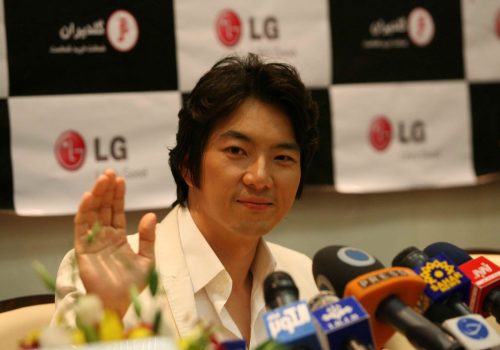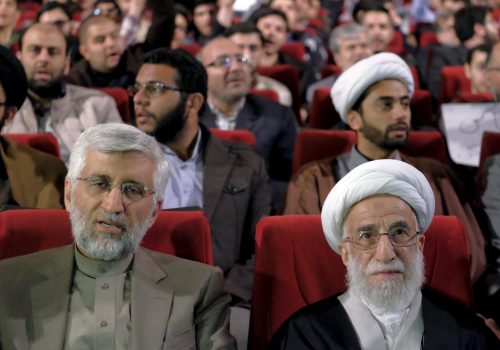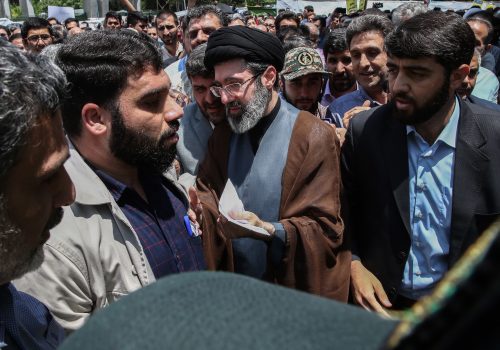Britain is mourning Queen Elizabeth II. But for many Iranians, she was the ‘Queen of Coups.’
“Friends, forgive me if I’ve wronged you,” read a memorial to Queen Elizabeth II posted in the back window of a car in southern Tehran. Since the longest reigning British monarch’s passing at the age of ninety-six on September 8, Iranians have shared mixed emotions about the late queen and the British Empire’s exploitation of Iran during the nineteenth and twentieth centuries.
Iranians have their own issues with an elderly leadership that, unlike in the United Kingdom, actually determines the policies of the Islamic Republic. Supreme Leader Ayatollah Ali Khamenei, eighty-three, has been in power since 1989, and there are numerous other clerics in the same age group. They include Ayatollah Ahmad Jannati, ninety-five, who recently was re-selected to the twelve-member Guardian Council, an influential vetting body, resulting in many ageist memes and jokes.
Ironically, many hardliners defended Jannati’s continued role at the time by comparing him to Queen Elizabeth, given that he would be 101 years old if he finishes his latest six-year term in 2028—the oldest member of the Guardian Council in the Islamic Republic’s forty-three-year history.
After news of the monarch’s death, many memes were posted relating to how Jannati had outlived the queen (in one instance, a fake Jannati mourned her passing in a song).
At the same time, there is a sense of nostalgia among some Iranians for their own long-lost monarchy. As mismanagement, corruption, and disillusion with the Islamic Republic continues to grow, some Iranians in their protest chants evoke the name of Reza Shah, the founder of the Pahlavi dynasty. He took power in the 1920s with the help of the British but was later forced to abdicate by them and was exiled to South Africa due to his alleged pro-Axis leanings. Allied forces then put Reza Shah’s young, inexperienced son, Mohammad Reza, on the throne in his place, and was later ousted during the 1979 revolution.
Many Iranians posted and shared photos and videos from Queen Elizabeth’s state visit to Iran in 1961 and now King Charles III’s one-day visit to Iran in February 2004—on the eve of the anniversary of the 1979 revolution—when he visited the capital Tehran and the southeastern city of Bam, which had been devastated by an earthquake a few months prior.
In the wake of the headline news, an Iranian user tweeted, “Enough with Queen #Elizabeth and Prince Charles. Let’s return to real life and see how we can get rid of” Khamenei and “Prince” Mojtaba, who is viewed as heir apparent by many. In early September, a news outlet that covers seminaries in Qom referred to Mojtaba as “ayatollah,” a first in state media outlets, hinting at his rumored ascension to the clerical throne. However, interestingly, in the wake of Queen Elizabeth’s death, both reformists and hardliners mocked the British monarchy’s hereditary model as outdated.
There has been no public condolence issued by any top-ranking Iranian official to date. Iran’s President Ebrahim Raisi was not sent an invite to the funeral, but Iran has requested to send its acting UK ambassador.
Once news of the sovereign’s passing broke, state media outlets instead focused on Britain’s role in a 1953 coup d’état that ousted popular Prime Minister Mohammad Mossadegh, who had nationalized Iran’s oil. Jaam-e Jam newspaper’s frontpage read: “The End of the Queen of Coups,” while Islamic Revolutionary Guard Corps-affiliated Tasnim News Agency referred to her as “The Last Survivor of the Coup.” Tasnim published a separate article entitled: “The Death of the British Queen: Will the Legacy of Royal Scandals Continue?,” which mentioned the relationship Prince Andrew had with the late sex offender and financier Jeffery Epstein. The article also referred to “the moral corruption of [King] Charles,” perhaps referring to his adultery with Camilla, now his Queen Consort, when married to Princess Diana.
Other outlets took similar anti-imperialist stances, with Fars News Agency noting that “The former British queen leaves a legacy of not only hundreds of millions of dollars but also the spilled blood of hundreds of thousands of people around the world.”
Government-affiliated outlets aside, many Iranians still don’t forget the role the British Empire played in their country, like many others across the globe which had undergone occupation and colonization. Britain loomed particularly large in pre-twentieth century Iranian history, a role that only grew with Britain’s discovery of oil in the southwestern city of Masjid-Suleiman in 1908.
The British and Soviet allies occupied Iran during both World War I and World War II, conflicts that contributed to famines (the 1917-1919 famine killed an estimated 9 million people or 40 percent of the population at the time, according to one academic). So great are the sensitivities surrounding this topic that, in 2021, when the Russian embassy in Tehran tweeted a photo of the Russian and British ambassadors to Iran re-enacting a famous 1943 Tehran Conference photo—featuring US President Franklin Roosevelt, UK Prime Minister Winston Churchill, and Soviet leader Joseph Stalin—there was a large outcry from Iranians across the political spectrum and the ambassadors were summoned for a reprimand. But, as historian Roham Alvandi noted at the time, “The 1943 Tehran Conference should be a source of pride for us Iranians. With a very weak hand, Iranian diplomacy succeeded in wrestling an Allied commitment to Iran’s independence and territorial integrity. This was crucial to Iran’s survival during and after WWII.”
In 1953, the Central Intelligence Agency, egged on by Britain’s MI-6, led a successful coup d’état that overthrew Mossadegh so that Britain and later the United States could retain control over Iran’s oil resources—which had been obtained in an unjust concession and rightfully belonged to the Iranian people. One reason why the US embassy in Tehran was seized on November 4, 1979 and US diplomats held hostage for 444 days, was to preclude a potential coup by the US that would reinstate the Shah again (the UK embassy in Tehran was stormed in 2011 and ties were briefly suspended until 2016).
The negative historical and political influence of the British in Iran is so well-known that the line “It’s the work of the British” (كار كار انگليسی هاست) is regularly quoted from the beloved Iranian satiric novel, My Uncle Napoleon by Iraj Pezeshkzad. The title character is obsessed with conspiracy theories associated with Britain. The country is also regularly referred to as the “Old Fox” in the same way that the United States is called the “Great Satan.”
Prior to his ousting via coup, Mossadegh told US envoy Averell Harriman, “You do not know how crafty [the British] are. You do not know how evil they are. You do not know how they sully everything they touch.”
While Queen Elizabeth II did not play a direct role in British imperialism and actually reigned as the empire declined, Iranians inside and outside Iran—regardless of their political views and affiliations—will never forget the role Britain once played in exploiting their country’s wealth and controlling their destiny.
Holly Dagres is editor of the Atlantic Council’s IranSource blog, and a nonresident senior fellow with the Middle East Programs. She also curates The Iranist newsletter. Follow her on Twitter: @hdagres.
Further reading
Wed, Oct 27, 2021
Iranians give ‘Squid Game’ the green light
IranSource By Holly Dagres
With "Squid Game" becoming a global phenomenon, it’s no surprise that it’s also gaining popularity in Iran. But the Iranian fascination with the show comes at a time when Iran and South Korea are having their own drama.
Tue, Jul 19, 2022
Ayatollah Ahmad Jannati may outlive all of us—even the Angel of Death
IranSource By Holly Dagres
With Ayatollah Jannati continuing his role, the Supreme Leader is solidifying his control on power and trying to ensure a like-minded successor.
Wed, Sep 7, 2022
Rumors of Mojtaba Khamenei being crowned with the Supreme Leader’s turban have been circulating for years. Now it may happen.
IranSource By
As President Ebrahim Raisi has stumbled, the prospects of the only other likely candidate for Supreme Leader have advanced. Attention is now focused on Ayatollah Ali Khamenei’s second son Mojtaba, who seemed from the outset to be orchestrating Raisi’s presidency.
Image: Graffiti in Persian reading "Death to England" is seen above a picture of Britain's Queen Elizabeth at the British Embassy in Tehran, Iran August 23, 2015. Britain reopened its embassy in Tehran on Sunday, nearly four years after protesters ransacked the ambassador's residence and burned the Union Jack. In a signal of the most striking thaw in Western ties with Iran for over a decade, Foreign Secretary Philip Hammond watched the British flag being raised in the garden of the opulent 19th century building while the national anthem played. REUTERS/Darren Staples


